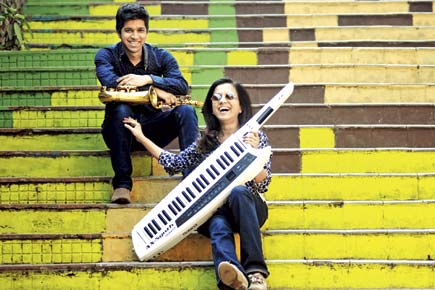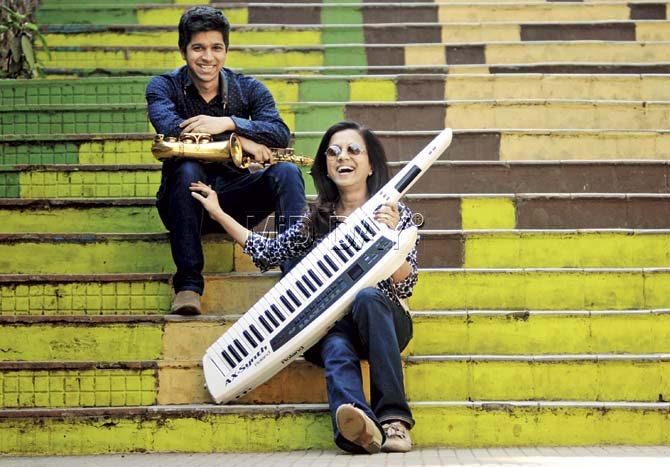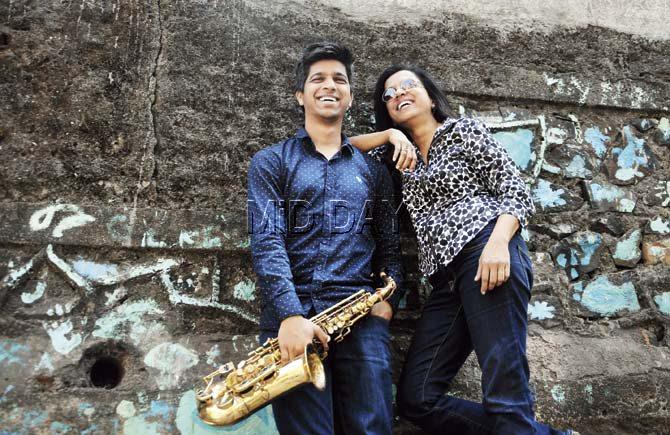India’s foremost composer and pianist, Merlin D’Souza and her son Rhys D’Souza, India’s most prodigious saxophone talent talk to Suprita Mitter about their relationship on and off stage

“My mom loves to talk, especially when I am around. She is the only one who knows how to keep me mum,” says the boy, flashing an impish smile and looking quite pleased at his punning.

Musicians Merlin and Rhys D’Souza share a laugh on Mount Mary Steps in Bandra. Pics/Satyajit Desai
“He is my ‘Rhyson’ to be,” quips the mother, in a prompt repartee. That is how one of India’s foremost composers and pianists, Merlin D’Souza and her son Rhys D’Souza, one of the most prodigious saxophone talents in the land, describe each other. “You wanted a mom-son interview; you have no idea what you’ve asked for,” Rhys adds in jest.

Merlin and Rhys D’Souza sharing a light moment
The two seem completely at ease with each other and work on a few corporate gigs together these days. “I like to do just one run-through before a performance, and then leave it to the live gig. If I had to go impromptu, the only person I would do that with is my mom.
We share telepathic communication on stage, which is rare to find in most duet performances,” admits Rhys. “As a child, it used to be fun to sometimes disobey her on stage. The rebel stage had its repercussions at home and on most things. I believe I have matured from that point. Now, we try and keep it professional,” he reveals.
Son rise
Rhys had an early start to his music career. He made his debut as part of the 13-piece Jazz group called The Big Band, playing alongside veteran city musicians such as his mother, the Monserrate Horn Players and vocalists Shazneen, Vivian Pocha, Suzy Q and Bianca and Jazzy Joe.
“Both my parents are musicians. Both my grandfathers were musicians too; sometimes, it feels like a family business. My mom says I showed an interest in music from the age of three (laughs); I don’t remember. I started going to piano class but at that stage I just wanted to play football. I got bored and quit.
I used to sing a lot. I did quite a few jingles as well. I wasn’t into playing an instrument back then.” He adds how he learnt to play the clarinet later, and then, the saxophone. “I enjoy music and I also enjoy writing, theatre and football. I take a break once in a while to do things other than music,” quips the 26-year-old.
Mum’s the word
Merlin, however, didn’t have it that easy. “My father was adamant. We had to learn the piano and to sing. It wasn’t much of a choice back then. When we had guests we had to entertain them with a performance,” she laughs. Rhys is quick to interrupt and remind her that she subjected him to that too, which Merlin promptly dismisses.
“Growing up in Bandra has its own charm, so I grew up singing at church and at gatherings all the time,” she adds. Merlin started learning the piano when she was six, became an All India Radio performing artiste at nine, started playing in the church at 12 and bunked college at 18 to score and perform for Noel Godin’s musical production, Blood Brothers.
She is trained in Western Classical and Jazz. She is also part of the popular all-woman band, Indiva. “Music has so many avenues theatre, advertising, corporate gigs: the sky is the limit. I love performing live though. It keeps me going,” she shares.
Notes from around
Rhys prefers performing outside Mumbai. Both Merlin and he agree that cities like Pune, Bangalore and most of the North East have a more vibrant gig culture. Mumbai, being the true business capital, tends to be too busy at times and also lacks the space required for certain kinds of music festivals, they believe.
Talking about the changing, alternate music scene in India, Merlin shares, “The last decade was a lot more vibrant. With MTV and Channel V, Indipop came up in a big way giving Indie, Folk, independent sounds and non-Bollywood artistes and bands a platform to showcase their works.
Today, Bollywood dominates the scene completely, including music festivals. I like Bollywood work too; it’s just that other genres deserve an equal footing.”
Genre gap
She cites the example of music festivals abroad that include all genres including Trance, Hip-Hop, Blues, Jazz and many others. She elaborates, “Here, when we invite foreign artists we don’t expect them to play Hollywood tracks.
We invite artists from the independent space but while inviting Indian artistes we tend to focus on the Bollywood genre. Few festivals, however, are making a conscious effort to encourage alternate genres. That needs to happen more and more and these gigs shouldn’t get limited to a few restaurants and clubs.”
Rhys is shaking his head in disagreement, through most of this conversation. “Indian festivals are really young compared to the world music festivals, and they do invite artists from all genres. My favourite one was RIFF (Rajasthan International Folk Festival) at Mehrangarh, which had Sufi and Folk.
A music festival in Delhi invited even Safal Jazz from Pakistan, which was fabulous. They have to make their money too. Give them some time.” He stresses how too much variety may not be a good thing.
“If you went to a restaurant, and they offered Indian, Chinese and Continental, all on the menu, you are going to wonder what they are actually good at,” he explains. “See…we agree to disagree,” says Merlin on a parting note.
 Subscribe today by clicking the link and stay updated with the latest news!" Click here!
Subscribe today by clicking the link and stay updated with the latest news!" Click here!









